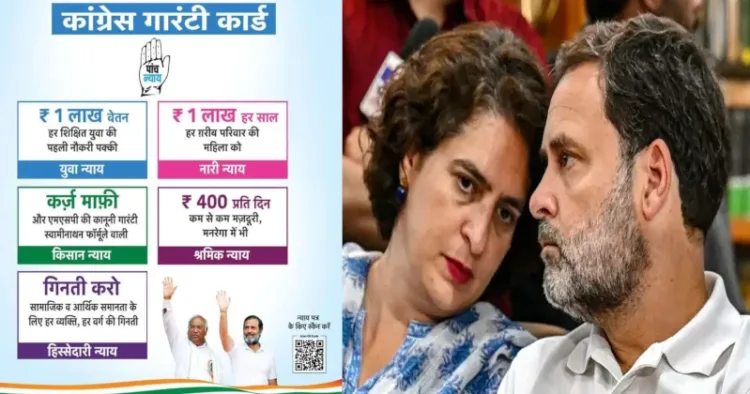In the wake of recent general elections, the Congress party finds itself embroiled in a controversy surrounding allegations of bribery linked to its “Khatakhat” cash transfer scheme. The accusations, spearheaded by New Delhi-based lawyer Vibhor Anand, have prompted a formal complaint to President Droupadi Murmu, urging the Election Commission of India (ECI) to launch an investigation into the matter and potentially disqualify the 99 Congress MPs elected under this campaign promise.
The Khatakhat Scheme, aggressively championed by the Congress party, entailed the provision of Rs 8,500 monthly and Rs 1 lakh annually to the bank accounts of women voters, contingent upon their electoral support for the party. Reports emerged of the distribution of “guarantee cards” across several states, with key party figures such as Rahul Gandhi and Priyanka Gandhi leading the charge. Despite facing defeat in his traditional stronghold of Amethi in 2019, Rahul Gandhi clinched victories in Raebareli, Uttar Pradesh, and Wayanad, Kerala, purportedly buoyed by this scheme’s populist appeal.
Visuals showed a large number of Muslim women lining up outside a Congress office in Lucknow in the sweltering heat. Some were there to demand ‘guarantee cards,’ while others, who had previously received them, submitted forms to receive the promised money in their accounts. Several women claimed they had received receipts from the Congress office after providing their details.
The Congress launched the ‘Ghar Ghar Guarantee’ program, tasking leaders with reaching out to nearly 80 million households to promote its 25 guarantees. Earlier, the General Post Office in Bengaluru saw several women rushing to open accounts, anticipating a monthly deposit of Rs 8,500 if the I.N.D.I Alliance came to power at the Centre.
However, these purported gains have been overshadowed by accusations of electoral malpractice. Anand contends that such actions represent a blatant violation of the Representation of People Act, 1951, particularly Section 123, which defines bribery as any form of gratification to influence electoral outcomes. “The act of promising Rs 1 lakh directly to voters’ accounts for their votes for the Congress Party amounts to bribery,” Anand asserted, citing explicit terms outlined in electoral legislation.
Moreover, the controversy deepens with allegations of targeted voter manipulation. Anand highlighted a conspicuous turnout of Muslim women at Congress offices in the days preceding the election, hinting at a deliberate effort to sway a specific demographic segment. Such claims raise concerns about the integrity of the electoral process and the ethical conduct of political parties vying for power.
In response to these allegations, Anand has called for decisive action from the Election Commission of India, invoking Section 146 of the Representation of the People Act, 1951, to initiate a thorough inquiry. His demands extend to the potential disqualification of implicated Congress leaders, including Rahul Gandhi, Mallikarjun Kharge, Priyanka Gandhi Vadra, Sonia Gandhi, and all party members involved in the alleged bribery scheme. Additionally, he advocates for the annulment of the electoral victories of the 99 Congress candidates elected to the Lok Sabha under the cloud of suspicion.

















Comments